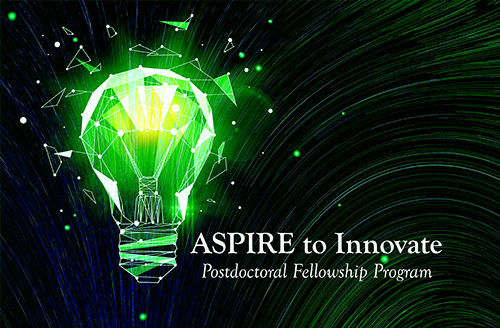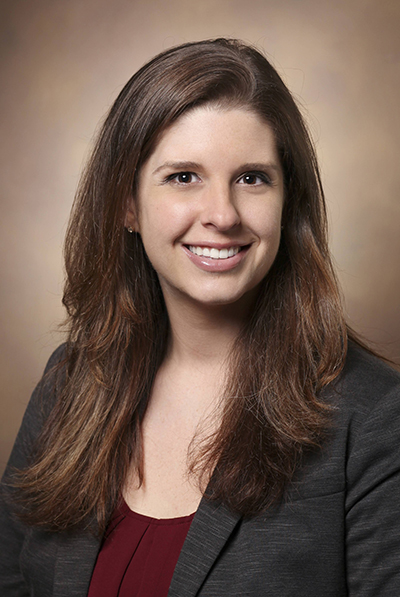By Ashley Brady

A new collaborative initiative from the Vanderbilt University School of Medicine Basic Sciences, the BRET Office of Career Development’s ASPIRE Program, and Vanderbilt’s Center for Technology Transfer and Commercialization will be supporting a biomedical sciences postdoctoral fellow to lead a start-up company to be formed by Vanderbilt. The goal of the program is twofold: (i) to provide a biomedical Ph.D. scientist with extensive mentorship, supplemental training, networking opportunities with investors and potential strategic/other assistance to successfully launch a company, and (ii) to commercialize technologies discovered at Vanderbilt University.
The ASPIRE to Innovate Postdoctoral Fellowship Program officially commenced on July 1, 2021, with Karrie Dudek selected as its first fellow following a competitive application and interview process this spring. Dudek recently defended her dissertation after completing her Ph.D. research training as a graduate student in the Department of Cell and Developmental Biology. During her research training, she was actively involved in multiple initiatives around campus to augment her research skills with business and management, leadership, and consulting experiences. She served as a Business Development Analyst at the local start-up Utilize Health through the ASPIRE Internship program, where she gathered data on new markets and company profiles to aid in the development of a sales strategy for the company.
More recently she has been volunteering her time with the Wond’ry Innovation Consulting Program as a consultant to the nascent medical device company Gait Guide, where she worked with a team of five people to lead the effort in market research and competitor analysis that was part of a detailed business plan for the company.
Dudek was both thankful and thrilled for the opportunity to be a pioneer for the ASPIRE to Innovate Program. “For me, the program offered the rare opening to take a ‘not-so-risky’ chance on myself to co-found a company by having an incredible level of support from across Vanderbilt built in. Being a part of the growing entrepreneurial community here also will undoubtedly enable me to grow as a leader and further develop my business skillsets.”

For the inaugural program, Dudek and her colleagues in the CTTC have elected to focus their efforts on the development of a biomaterial for use in regenerative medicine, a technology developed by Ethan Lippmann, assistant professor of chemical and biomolecular engineering. Although prior biomaterials technologies have been developed to grow capillaries, Lippmann’s new biomaterial has been shown to promote growth of arterioles, which are larger and can withstand higher-pressure outflows and thus may be more effective in combatting ischemia resulting from aging, disease, and surgeries.
The ASPIRE to Innovate Postdoctoral Fellowship Program will provide funding for up to two years for Dudek to work full-time on turning Lippman’s idea into a company. Moreover, she will have the opportunity to become a co-founder in the new venture. She started her fellowship this summer and is working in the CTTC, learning about intellectual property rights, licensing, start-up companies, and market research. She will also work directly with Lippmann and his research team to gain familiarity with the technology and form an advisory board to help guide the business formation, as well as to provide her with mentorship.
Peter Rousos, director of the Economic and New Venture Development at Vanderbilt’s CTTC, has played a key role in helping to launch the program and is excited about the new opportunities it provides. “The term ‘game changer’ to describe an event or a program is often overused,” Rousos said, adding:
I think the term has clear applicability to the ASPIRE to Innovate Fellowship Program. Vanderbilt and other research institutions invent and discover complex technologies. In instances where the technology can be commercialized via a startup company, they will require management teams who understand both the current application and future implications of the technology. Training scientists to participate in these startups as leaders and managers will have a significant positive impact on the companies’ success. Additionally, it will greatly enhance the entrepreneurial ecosystem within Vanderbilt.
In the fall, Dudek will take part in The Wond’ry’s Ideator program with the goal of applying to the National Science Foundation’s I-Corps program. From there, she will participate in subsequent programming at the Wond’ry, including the Builder and Founder programs over the following year and a half. There will also be many opportunities for self-directed learning and for growing her network of mentors and advisors. During this period, Dudek will be part of the team that decides when and how to start the company that will commercialize Lippman’s technology.
“We are very optimistic about Dudek and are convinced she will do very well as the first fellow to participate in this important program,” Rousos said.
Deliverables for participating fellows such as Dudek will include creating a market research and customer discovery presentation, developing a business plan and financial model, building a pitch deck for speaking to investors and delivering it at various business pitch competitions, and submitting applications for a Launch Tennessee microgrant and a Small Business Innovation Research grant to secure future funding.
“We are very excited to launch this fellowship, not only as a training opportunity for a biomedical postdoc, but also to assist in stimulating an entrepreneurial culture in the basic sciences community,” said Kathy Gould, senior associate dean for biomedical research, education and training. “We are grateful to Dean Larry Marnett of the School of Medicine Basic Sciences for his support in launching this outstanding program, as well as the CTTC, the Wond’ry and Dr. Lippmann for their support of this new initiative.”